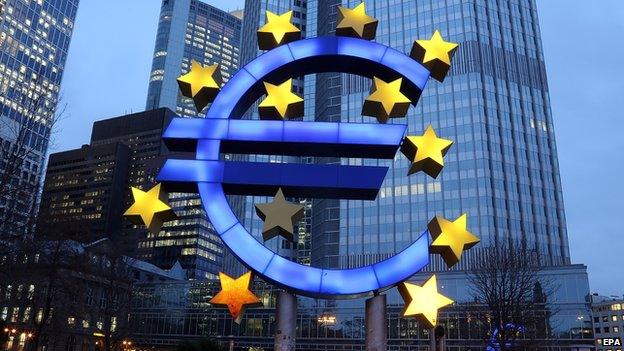Eurozone deflation gathers pace in January
- Published

Deflation gathers pace across the eurozone
Deflation across the 19 countries that use the eurozone currency is gathering pace.
In January, prices in the eurozone were 0.6% down on their levels a year ago.
The figure shows the eurozone heading deeper into deflationary territory from December, when prices were 0.2% down on the year before.
A large contributor to falling prices is the cost of energy, with oil prices down almost 60% on the middle of last year,
Energy prices plunged 8.9% in January.
If food and energy are stripped out of the calculations, eurozone prices were still rising at an inflation rate of 0.5%, down from 0.7% the month before.
The eurozone has only once before experienced deflation at these levels, in July 2009, as the region first went into recession following the financial crisis.
Last week the European Central Bank (ECB) launched a programme aimed at pushing prices back up - known as quantitative easing - through which it injected around 1 trillion euros into the economy.

Analysis: Andrew Walker, BBC world service economics correspondent
It was energy prices that have pulled the eurozone into deflation.
But prices across the economy are rising slowly - well short of the European Central Bank's target of below but close to 2%.
So while cheaper energy is welcome news for a net importer of the stuff, as the eurozone is, the danger of a period of wider and potentially more damaging deflation is there. Debt is probably the big issue.
Deflation in effect raises real, inflation adjusted interest rates. It makes repayments more burdensome for borrowers with falling incomes, or for governments, tax revenues.
So the European Central Bank president Mario Draghi will no doubt see these figures as supporting the decision last week to launch a programme of quantitative easing intended to push inflation higher.
Still, other new data show that a period of deflation doesn't necessarily mean an economy can't grow.
In Spain, where prices were falling for much of last year, the economy grew at a respectable 0.7% in the last quarter of 2014.

Stability target
Christian Schulz, senior economist at Berenberg Bank said the latest figures showed that "the ECB was ... more than justified in taking aggressive action earlier this month.
"The multi-stimulus of cheap oil, a weak euro and aggressive monetary easing is now stabilising expectations and will help the ECB reach its price stability target over time."
There was better news on eurozone unemployment, which fell to 11.4% in December, down from 11.5% in November.
Within that figure there are huge differences between jobless levels in different countries.
Germany has a 4.8% unemployment rate. But 25.8% of Greece's labour force is out of work and Spain's jobless rate is 23.7%.
The euro was slightly higher after the news, rising 0.35% against the dollar to $1.1358, and sending the pound down 0.25% to €1.3276.